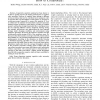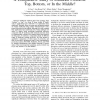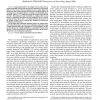213 search results - page 35 / 43 » User simulations for evaluating answers to question series |
TCOM
2010
13 years 7 months ago
2010
—Cooperative spectrum sensing has been shown to be able to greatly improve the sensing performance in cognitive radio networks. However, if cognitive users belong to different se...
RTCSA
2009
IEEE
14 years 3 months ago
2009
IEEE
The question whether preemptive systems are better than non-preemptive systems has been debated for a long time, but only partial answers have been provided in the real-time liter...
JAIR
2006
13 years 9 months ago
2006
In this paper we propose a data intensive approach for inferring sentence-internal temporal relations. Temporal inference is relevant for practical NLP applications which either e...
INFOCOM
2005
IEEE
14 years 2 months ago
2005
IEEE
— Multicast solutions have been evolving from “bottom” to “top”, i.e., from IP layer (called IP multicast) to application layer (referred to as application layer multicas...
INFOCOM
1999
IEEE
14 years 1 months ago
1999
IEEE
Abstract--Using multicast delivery to multiple receivers reduces the aggregate bandwidth required from the network compared to using unicast delivery to each receiver. However mult...



